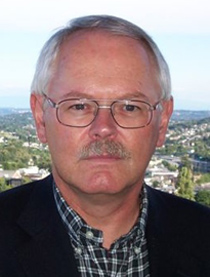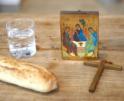
Spirituality
From earliest childhood through mid-life, I courted a romance with restlessness, with stoicism, with being the lonely outsider, with being the one at the party who found it all too superficial to be real.

Rolheiser
Thirty-four years ago when I launched this column, I would never have said this: Restlessness is not something to be cultivated, no matter how romantic that might seem. Don't get Jesus confused with Hamlet, peace with disquiet, depth with dissatisfaction, or genuine happiness with the existential anxiety of the artist. Restlessness inside us doesn't need to be encouraged; it wreaks enough havoc all on its own.
But I'm a late convert to this view. From earliest childhood through mid-life, I courted a romance with restlessness, with stoicism, with being the lonely outsider, with being the one at the party who found it all too superficial to be real. Maybe that contributed to my choosing seminary and priesthood; certainly it helps explain why I entitled this column, In Exile. For most of my life, I have equated restlessness with depth, as something to be cultivated,
This came naturally to me and all along the way I've found powerful mentors to help me carry my solitude in that way. During my high school years, I was intrigued with Shakespeare's, Hamlet. I virtually memorized it. Hamlet represented depth, intensity, and romance; he wasn't a beer-drinker. For me, he was the lonely prophet, radiating depth beyond superficiality.
In my seminary years I graduated to Plato ("We are fired into life with a madness that comes from the gods and has us believe that we can achieve a great embrace, make ourselves immortal, and contemplate the divine"); to Augustine ("You have made us for yourself, Lord, and our hearts are restless until they rest in you"); to John of the Cross (We go through life fired by love's urgent longings); to Karl Rahner ("In the torment of the insufficiency of everything attainable, we learn that here in this life there is no finished symphony"). Reading these thinkers helped me put my youthful romanticism under a high symbolic hedge.
Alongside these spiritual writers, I was much influenced by a number of novelists who helped instill in me the notion that life is meant to be lived with such an inner intensity and high romanticism so as to preclude any simple satisfaction in life's normal, everyday pleasures and domestic joys. For me, Nikos Kazantzakis' characters radiated a passion that made them virtually godlike and irresistibly enviable, even as they struggled not to self-destruct; Iris Murdoch described loves that were so obsessive, and yet so attractive, as to make everything outside of them unreal; and Doris Lessing and Albert Camus seduced me with images of an inner disquiet that made ordinary life seem flat and not worthwhile. The idea grew in me that it was far nobler to die in unrequited longing than to live in anything else. Better dead in intensity that alive in domestic normalcy. Restlessness was to be encouraged.
And much in our culture, especially in the arts and the entertainment industry, foster that temptation, namely, to self-define as restless and to identify this disquiet with depth and with the angst of the artist. Once we define ourselves in this way, as complex, incurable romantics, we have an excuse for being difficult and we also have an excuse for betrayal and infidelity. For now, in the words of a song by The Eagles, we are restless spirits on an endless flight. Understandably, then, we fly above the ordinary rules for life and happiness and our complexity is justification enough for whatever ways we act out. As Amy Winehouse famously self-defines: "I told you I was troubled, and you know that I'm no good." Why should anyone be mystified by our refusal of normal life and ordinary happiness?
There's something inside us, particularly when we are young, that tempts us towards that kind of self-definition. And, for that time in our lives, when we're young, I believe, it's healthy. The young are supposed to overly-idealistic, incurably romantic, and distrustful of any lazy fall into settling for second-best. As Doris Lessing puts it, there's only one real sin in life and that's calling second-best by anything other than what it is, second-best! My wish is that all young people would read Plato, Augustine, John of the Cross, Karl Rahner, Nikos Kazantzakis, Iris Murdoch, Doris Lessing, Jane Austin, and Albert Camus.
But, except for authors such as Plato, Augustine, John of the Cross and Karl Rahner, who integrate that insatiable restlessness and existential angst into a bigger, meaningful narrative, we should be weary of defining ourselves as restless and cultivating that. High romanticism will only serve us well if we eventually set it within a self-understanding that doesn't make restlessness an end in itself. Just feeling noble won't bring much peace into our lives and, as we age and mature, peace does become the prize. Romeo, Juliet, Hamlet, Zorba the Greek, Doctor Zhivago, and the other such mega-romantic figures on our screens and in our novels can enflame our romantic imaginations, but they aren't in the end images for the type of intimacy that makes for a permanent meeting of hearts inside the body of Christ.
- Oblate Father Ron Rolheiser, theologian, teacher, and award-winning author, is President of the Oblate School of Theology in San Antonio, TX. He can be contacted through his website www.ronrolheiser.com.
Now on Facebook www.facebook.com/ronrolheiser
Recent articles in the Spirituality section
-
He saw the cloths and believedBishop Robert Barron
-
God's instrument for viewing the crucifixionMichael Pakaluk
-
QuinquagesimaMichael Pakaluk
-
Pro-life Christians: Now is the time to shout from the rooftopsBishop Robert Barron
-
Seeking an indulgence as an act of faithMichael Pakaluk


















